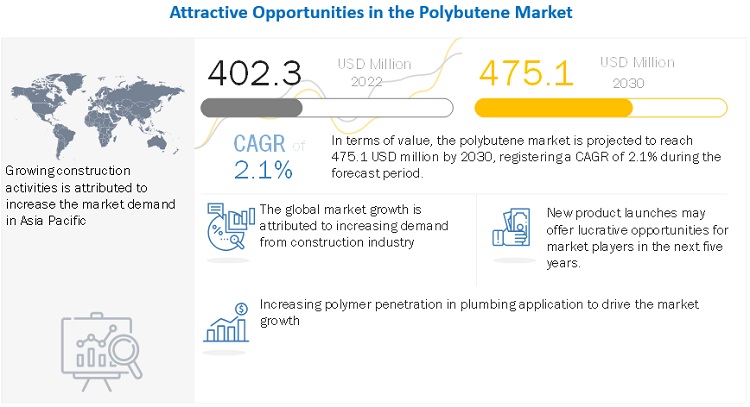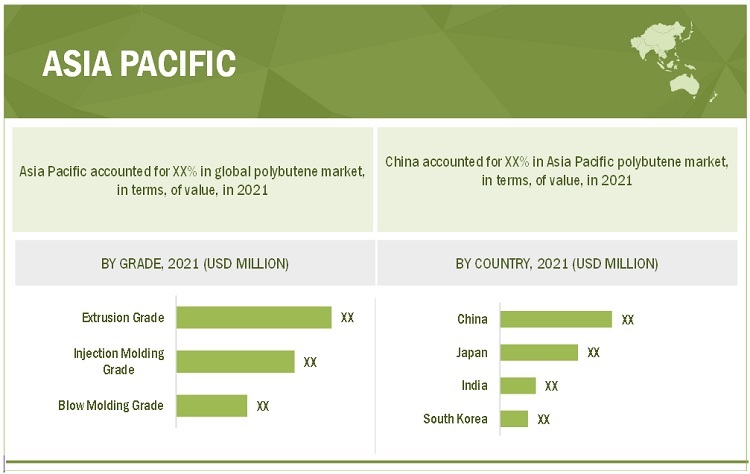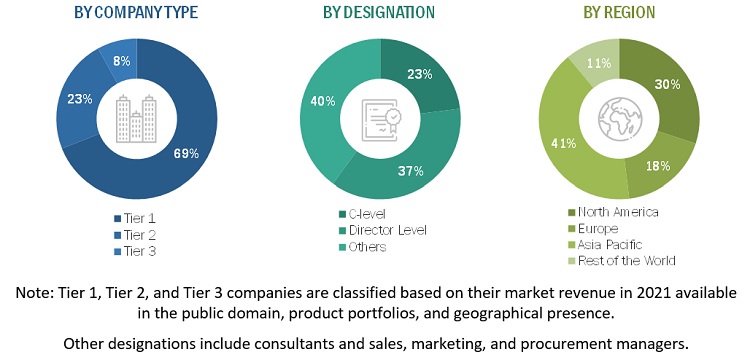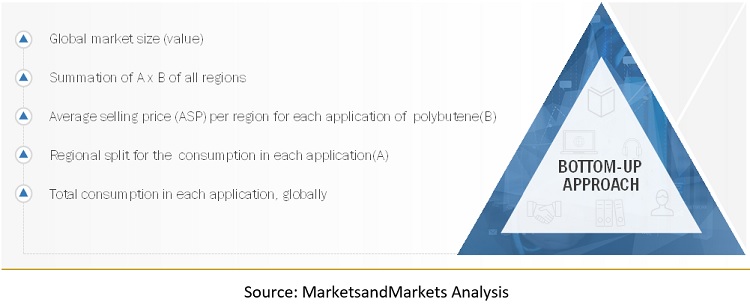Polybutene Market by Grade (Extrusion, Injection Molding, Blow Molding), Application (Plumbing system, Packaging System, Hot Melt adhesives, Others) and Region (North America, Europe, Asia Pacific, South America, Middle East & Africa) - Global Forecast to 2030
The polybutene market is projected to reach USD 475.1 million by 2030, at a CAGR of 2.1% from USD 402.3 million in 2022. The product serves as the main raw material for the easy-peel packaging and PB-1 piping system. Due to the world's increasing urbanization, piping demand has been rising. In Asia Pacific and Latin America, rapid urbanization has provided enormous opportunities for the polybutene industry. Additionally, the replacement of conventional building and construction materials has increased demand for alternative materials with better properties.

To know about the assumptions considered for the study, Request for Free Sample Report
Market Dynamics
Driver: Superior quality of polybutene
The excellent mechanical and chemical resistance properties of polybutene make it a great choice in the chemical and oil industries. It provides protection from unfavorable reactions and non-degradability in presence of strong chemicals, therefore the inert nature that it exhibits is helping its market to grow. The capacity of polybutene to withstand high pressure under normal circumstances is another good quality that has helped this industry grow its market share in applications such as pipelines and others.
Restraints: High cost for polybutene
One of the major restraints for polybutene is its high cost. Despite the fact that product prices have been constant in recent years, they are still very dependent on the cost of raw materials. Prices are influenced by the feedstock ingredient butene-1, and a shortage of butene-1 can cause a sharp spike in product costs. Global polybutene-1 market is oligopolistic in nature where handful of manufacturers have total dominance over production capacity.
Opportunities:Growing use in packaging application
Major uses for polybutene include seal-and-peel packaging and easy-peel packaging. Easy-opening packaging is frequently used for pre-packaged foods including cheese, meat, fish, cereals, and carton liners. Customers have different expectations for food packaging and other simple-to-open products. Easy-open packaging is in high demand due to customers' busy lifestyles and their preference for ready-to-eat meals. During the projection period, rising packaging demand would propel the use of polybutene-1 in items with easy peel packaging.
Challenges: Legal issue with its usage in few regions
The numerous legal issues surrounding its use are one of the major limitations on this industry. As polymer goods have a particularly serious detrimental influence on the environment because to their non-degradable qualities, they have been banned from use in pipelines and heating systems throughout the North American region. In North America, the usage of polybutene products is constrained by stringent regulatory norms and environmental regulations for plumbing applications.
“Extrusion Grade was the largest grade for polybutene market in 2021, in terms of value”
In 2021, the extrusion grade dominated the global polybutene market, in terms of value. Due to growing construction activities across the globe, the demand for extrusion products such as pipe/tubing, fencing, window frames and others has increased. Growing construction activity has increased the demand for polybutene within extrusion grade.
“Plumbing system was the largest application for polybutene market in 2021, in terms of value”
Plumbing system dominated the global polybutene market by application, in terms of value, in 2021. Rapid construction activities specifically in Asia Pacific region is driving the demand for plumbing systems. Polybutene has expectational thermal, mechanical, and chemical resistance properties. These properties make it ideal for certain applications such as pressurized cold & hold water piping.
“Asia Pacific was the largest market for polybutene in 2021, in terms of value.”
The Asia Pacific market dominates the global polybutene market with a sizeable market share as a result of growing industrialization favoring polybutene end-use industries. Additionally, it is anticipated that government programs in China and India to promote economic growth via innovation would increase polybutene use. Low labor costs help the market expand, and economic growth is the main driver of this growth.

To know about the assumptions considered for the study, download the pdf brochure
Key Market Players
The key players in this market LyondellBasell Industries Holdings B.V. (Netherlands), BASF SE (Germany), DAELIM (South Korea), INEOS (UK), Mitsui Chemicals, Inc. (Japan), Lubrizol Corporation (U.S.), Dongfang Hongye Limited Company (China), and Braskem (Brazil). Continuous developments in the market—including new product launches, mergers & acquisitions, agreements, and expansions—are expected to help the market grow. Leading manufacturers of polybutene market have opted for new product launches to sustain their market position.
Scope of the Report
|
Report Metric |
Details |
|
Years considered for the study |
2017-2030 |
|
Base Year |
2021 |
|
Forecast period |
2022–2030 |
|
Units considered |
Value (USD Million) |
|
Segments |
Grade, Application, and Region |
|
Regions |
Asia Pacific, North America, Europe, Middle East & Africa, and South America |
|
Companies |
The key players in this market are BASF SE (Germany), Dongfang Hongye Limited Company (China), DAELIM (South Korea), INEOS (UK), Lubrizol Corporation (U.S.), LyondellBasell Industries Holdings B.V. (The Netherlands), Mitsui Chemicals, Inc. (Japan), TPC Group (U.S.), Ylem Technology Co., Ltd. (South Korea), Braskem (Brazil) and others |
This report categorizes the global polybutene market based on grade, application, and region.
On the basis of grade, the polybutene market has been segmented as follows:
- Extrusion Grade
- Injection Molding Grade
- Blow Molding Grade
On the basis of application, the polybutene market has been segmented as follows:
- Plumbing System
- Packaging System
- Hot melt adhesives
- Others
On the basis of region, the polybutene market has been segmented as follows:
- Asia Pacific
- Europe
- North America
- Middle East & Africa
- South America
Frequently Asked Questions (FAQ):
What is the expected growth rate of polybutene market?
The forecast period for polybutene market in this study is 2022-2030. The polybutene market is projected to grow at CAGR of 2.1%, in terms of value, during the forecast period.
Who are the major key players in polybutene market?
BASF SE (Germany), Dongfang Hongye Limited Company (China), DAELIM (South Korea), INEOS (UK), Lubrizol Corporation (U.S.), LyondellBasell Industries Holdings B.V. (The Netherlands), Mitsui Chemicals, Inc. (Japan), TPC Group (U.S.), Ylem Technology Co., Ltd. (South Korea), Braskem (Brazil) and others
What is the average selling price trend for polybutene market?
Prices are low in Asian countries (primarily China and India) compared to those in Europe and North America due to the low prices of raw materials and the availability of low-cost workforces in Asia Pacific .
To speak to our analyst for a discussion on the above findings, click Speak to Analyst

Table of content
1 Introduction
1.1 Objective of the study
1.2 Market definition
1.3 Market Scope
1.3.1 Years considered for the study
1.4 Currency
1.5 Unit Considered
1.6 Stakeholders
2 Research Methodology
2.1 Research Data
2.2 Secondary Data
2.2.1 Key data from secondary sources
2.3 Primary Data
2.3.1 Key data from primary sources
2.3.2 Breakdown of Primary Interviews
2.4 Market Size Estimation
2.4.1 Bottom-Up Approach
2.4.2 Top-Down Approach
2.5 Data Triangulation
2.6 Assumptions
2.7 Limitations
3 Executive Summary
4 Premium Insights
4.1 Opportunities in Polybutene Market
4.2 Polybutene Market, By Grade
4.3 Polybutene Market, By Application
4.4 Polybutene Market, By Region
5 Market Overview and Industry Trends
5.1 Introduction
5.2 Market Dynamics
5.2.1 Drivers
5.2.2 Restraints
5.2.3 Opportunities
5.2.4 Challenges
5.3 Supply Chain Analysis
5.3.1 Raw Material
5.3.2 Manufacturers
5.3.3 Distribution
5.3.4 End-Use Industry
5.4 Porter’s Five Forces Analysis
5.4.1 Threat of New Entrants
5.4.2 Threat of Substitutes
5.4.3 Bargaining Power of Buyers
5.4.4 Bargaining Power of Suppliers
5.4.5 Intensity of Competitive Rivalry
5.5 Average Selling Price
5.6 Regulatory Landscape
5.7 Industry Outlook
6 Polybutene Market, By Grade
6.1 Introduction
6.2 Extrusion Grade
6.3 Injection Molding Grade
6.4 Blow Molding Grade
7 Polybutene Market, By Application
7.1 Introduction
7.2 Plumbing System
7.3 Packaging System
7.4 Hot melt adhesives
7.5 Others
8 Polybutene Market, By Region
8.1 Introduction
8.2 Asia Pacific
8.2.1 China
8.2.2 India
8.2.3 Japan
8.2.4 South Korea
8.2.5 Rest of Asia Pacific
8.3 North America
8.3.1 U.S.
8.3.2 Canada
8.3.3 Mexico
8.4 Europe
8.4.1 Germany
8.4.2 France
8.4.3 Italy
8.4.4 U.K.
8.4.5 Rest of Europe
8.5 Middle East & Africa
8.5.1 Egypt
8.5.2 Saudi Arabia
8.5.3 South Africa
8.5.4 Rest of Middle East & Africa
8.6 South America
8.6.1 Brazil
8.6.2 Argentina
8.6.3 Rest of South America
9 Competitive Landscape
9.1 Introduction
9.2 Market Share Analysis
9.3 Company Evaluation Quadrant
9.4 Competitive Situation & Trends
9.4.1 New Product Launches
9.4.2 Contracts & Agreements
9.4.3 Partnerships & Collaborations
9.4.4 Joint Ventures
9.4.5 Expansions
10 Company Profile
10.1 BASF SE
10.1.1 Business Overview
10.1.2 Products Offered
10.1.3 Recent Development
10.1.4 MnM View
10.1.4.1 Key Strengths
10.1.4.2 Strategic choices made
10.1.4.3 Threat from competition
10.2 INEOS
10.3 DAELIM
10.4 Dongfang Hongye Limited Company
10.5 Lubrizol Corporation
10.6 LyondellBasell Industries Holdings B.V.
10.7 Mitsui Chemicals, Inc.
10.8 TPC Group
10.9 Braskem
10.10 Ylem Technology Co., Ltd.
10.11 List of other key market players
11 Appendix
11.1 Insights from Industry Experts
11.2 Discussion Guide
11.3 Related Reports
The study involved four major activities to estimate the size of polybutene market. Exhaustive secondary research was done to collect information on the market, the peer market, and the parent market. The next step was to validate these findings, assumptions, and sizing with industry experts across the value chain through primary research. Both top-down and bottom-up approaches were employed to estimate the complete market size. Thereafter, the market breakdown and data triangulation procedures were used to estimate the market size of the segments and subsegments.
Secondary Research
In the secondary research process, various secondary sources have been referred to for identifying and collecting information for this study. These secondary sources include annual reports, press releases, investor presentations of companies, white papers, certified publications, trade directories, certified publications, articles from recognized authors, gold standard and silver standard websites, and databases.
Secondary research has been used to obtain key information about the value chain of the industry, monetary chain of the market, the total pool of key players, market classification and segmentation according to industry trends to the bottom-most level, and regional markets. It was also used to obtain information about the key developments from a market-oriented perspective.
Primary Research
The polybutene market comprises several stakeholders in the value chain, which include raw material suppliers, manufacturers, distributors, and end users. Various primary sources from the supply and demand sides of the polybutene market have been interviewed to obtain qualitative and quantitative information.
The primary interviewees from the demand side include key opinion leaders in end-use sectors. The primary sources from the supply side include manufacturers, associations, and institutions involved in the polybutene industry.
The breakdown of profiles of the primary interviewees is illustrated in the figure below:

To know about the assumptions considered for the study, download the pdf brochure
Market Size Estimation
The top-down and bottom-up approaches have been used to estimate and validate the size of the polybutene market.
- The key players in the industry have been identified through extensive secondary research.
- The supply chain of the industry has been determined through primary and secondary research.
- All percentage shares, splits, and breakdowns have been determined using secondary sources and verified through primary sources.
- All possible parameters that affect the markets covered in this research study have been accounted for, viewed in extensive detail, verified through primary research, and analyzed to obtain the final quantitative and qualitative data.
- The research includes the study of reports, reviews, and newsletters of the key market players, along with extensive interviews for opinions with leaders such as directors and marketing executives.
Polybutene Market: Bottom-Up Approach 1

To know about the assumptions considered for the study, Request for Free Sample Report
Data Triangulation
After arriving at the total market size from the estimation process explained above, the overall market has been split into several segments and sub-segments. To complete the overall market engineering process and arrive at the exact statistics for all the segments and sub-segments, the data triangulation and market breakdown procedures have been employed, wherever applicable. The data has been triangulated by studying various factors and trends from both the demand and supply sides. Along with this, the market size has been validated by using both the top-down and bottom-up approaches and primary interviews. Hence, for every data segment, there have been three sources—top-down approach, bottom-up approach, and expert interviews. The data was assumed correct when the values arrived from the three sources matched.
Report Objectives
- To define, describe, and forecast the size of the polybutene market, in terms of value
- To provide detailed information regarding the major factors (drivers, opportunities, restraints, and challenges) influencing the growth of the market
- To estimate and forecast the market size based on grade, application, and region
- To forecast the size of the market with respect to major regions, namely, Europe, North America, Asia Pacific, and Middle East & Africa, and South America along with their key countries
- To strategically analyze micromarkets1 with respect to individual growth trends, prospects, and their contribution to the overall market
- To analyze opportunities in the market for stakeholders and provide a competitive landscape of market leaders
- To track and analyze recent developments such as expansions, new product launches, partnerships & agreements, and acquisitions in the market
- To strategically profile key market players and comprehensively analyze their core competencies2
Available Customizations
Along with the given market data, MarketsandMarkets offers customizations according to the company’s specific needs. The following customization options are available for the report:
- Regional Analysis
Further breakdown of a region with respect to a particular country or additional application
- Company Information
Detailed analysis and profiles of additional market players















Growth opportunities and latent adjacency in Polybutene Market